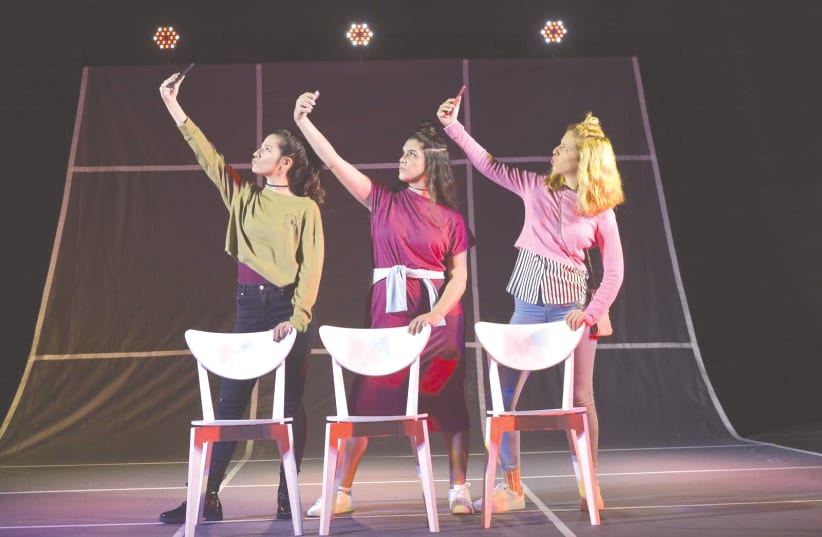With their phones glued to their hands like extra appendages, their hair pinned up in striking styles, and their bodies sheathed in skinny jeans and choker necklaces, the three teenage archetypes on stage are like a 21st-century update of the four sons of the Passover Haggada: there is the “wise” one, who curates social media accounts flooded with likes and followers, the “wicked,” who desperately wants her friend’s renown, and the “simple,” who does not care for any of it.
The fourth member of the group, in a tragic twist, is dead — bullied by her classmates to the point of suicide after someone leaked a revealing video of her. Now the three friends are in the interrogator’s room, where it will be revealed that one of them filmed the video, one of them leaked it, and one of them knew what was happening all along, but did nothing to stop it.
“We ask, who’s to blame?” says Gal Seri, one of the play’s creators and actresses. “And the answer is, we all are.”
Last Seen, a play based on numerous true stories, has taken Israel by storm this past year, emerging just as other productions, like the Netflix sensation 13 Reasons Why, shed a new light on adolescent suicides.
Its creators and actresses, Seri, Bar Elyakim and Or Rotem, have traveled to schools around the country, staging nearly 200 performances for middle and high school students over the course of the academic year.
“We would do two plays and be invited to do four more,” Elyakim explained. Word spread from teacher to teacher and school to school until the trio was summoned to perform at the Knesset in May. The Education Ministry has recommended the play for its initiative to battle online bullying, and it is up for nomination at the Stage Awards for Children and Youth in all categories, including best play.
The actresses, from the Orna Porat Theater Company for Children and Youth, were invited to write the play after submitting a short skit on body-shaming to a festival for young playwrights. Realizing how central social media is to the adolescent experience, they decided to expand on their original work to focus on that theme.
“From the moment I was exposed to this issue, it became the most important thing in the world for me to create a play about,” said Rotem, noting that one in three adolescents experiences some form of cyberbullying, and one in five will consider killing themselves.
“The educational system still doesn’t know how to deal with this, because it’s all inside the phone,” she said. “For the kids it’s up-close, but the parents and teachers have no connection to it. They don’t know how to deal with it, or stop it.”
Seri says that viewers describe the show as “a kick in the stomach,” an intense, 50-minute production that portrays the social media ecosystem and its festering power dynamics in all of their complexity.
“We don’t try to educate [the students],” she says. “We only try to put a mirror before them and let them see themselves.”
The students frequently find each of the vastly different characters to be relatable – one seventh grader mistook Elyakim for a peer his own age.
After their performances, the actresses open up the floor for discussion. But the creators of a show about cyberbullying and social media are not surprised when the teenagers are hesitant to raise their hands in public. Later, they will receive 10 to 15 messages on the social media accounts they operate, in which students send thank you messages, share their own stories, and request advice.
“A huge part of our work is simply to answer the children and help them,” Rotem says. “It’s more comfortable for them to use a phone: it’s their communication tool. We very much feel that this is holy work – succeeding to connect with children and helping them.”
As such, the trio is excited to see the play translated to English by 2020 to expand its reach to other countries. The 50-minute performance is intentionally minimalist: its staging requires nothing more than three chairs and an audio recording of the interrogator (voiced by Matti Seri), so that it can be easily performed anywhere, from school libraries to large venues.
“We feel that we had a good season, but we still don’t feel that the potential of this is finished,” Rotem said. “We still have many, many places to take this show.”
Shows coming up include August 18 at the Palace of Culture in Rishon Lezion and on August 31 at the Cameri Theatre’s theater awards for children and youth in Tel Aviv.
